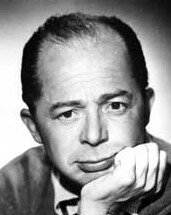
Zehn Prozent meiner Filme sind sehr gut, dreißig Prozent gut, sechzig Prozent schlecht.
*
22.06.1906, Sucha (heute: Sucha Beskidzka, Polen) † 27.03.2002, Beverly Hills, California, USA
Regisseur, Drehbuchautor, Produzent * ab 1924 Arbeit
für Boulevardblätter Die Bühne und Die Stunde in Wien * 1926 geht nach Berlin - dort freier Reporter für verschiedene
Zeitungen * daneben Ghostwriter für etablierte Drehbuchautoren * 1929
Mitarbeit an Robert Siodmaks halbdokumentarischer Collage Menschen am Sonntag * bis 1933 (Mit)verfasser zahlreicher
Drehbücher (Emil und die Detektive, 1931; Ein
blonder Traum, 1932) * 1933 Emigration nach Paris * 1933/34 Regiedebüt
* 1934 reist in die USA * 1936 Vertrag bei Paramount - Beginn einer langen
(bis 1950) und fruchtbaren Zusammenarbeit mit Charles Brackett (Ninotchka, 1939; Ball of Fire, 1941)
* 1942 Start seiner Karriere als Regisseur * 1945 kommt als Colonel der Information Control Division nach Deutschland * ab 1951 auch als Produzent
tätig * ab 1956 (Love in the Afternoon) Zusammenarbeit
mit dem Drehbuchautor I.A.L. Diamond * 1961 gewinnt für The Apartment als erster Filmmacher drei Oscars (Regisseur,
Drehbuchautor, Produzent) * 1965/66 erster Film mit dem Duo Jack
Lemmon-Walter Matthau * ab Mitte der 80er Jahre
Berater der United Artists - beteiligt an Entwicklung und Durchführung
von Filmprojekten * 1992 Rückschau auf seine Karriere in 6teiligen TV-Dokumentation
von Volker Schlöndorff Billy Wilder, wie haben Sie's gemacht ? * Kunstsammler
"The only thing that bothers me more than not being taken seriously is being taken too seriously."
FILMS
Mauvaise
(1933-F) Tragikomödie mit Danielle Darrieux | assistant-réalisateur: Alexander Esway
The Major and the Minor (Der Major und das
Mädchen, 1942-USA) Komödie mit Ginger Rogers, Ray Milland
Five Graves to Cairo (Fünf Gräber bis Kairo,
1943-USA) Kriegsabenteuer mit Franchot Tone, Anne Baxter
# Double Indemnity (Frau ohne Gewissen, 1943-USA) (Roman von James M. Cain) (09-11; 4404)
The Lost Weekend (Das verlorene Wochenende,
1944/45-USA) Alkoholikerstudie mit Ray Milland, Jane Wyman
The Emperor Waltz (Ich küsse ihre Hand,
Madame, 1946-USA) Musikkomödie mit Bing Crosby, Joan Fontaine
A Foreign Affair (Eine auswärtige Affäre, 1947/48-USA) Komödie/Satire mit Jean Arthur, Marlene Dietrich, John Lund
# Sunset Blvd. (Boulevard der Dämmerung, 1949-USA) (04-06; 5008)
The Big Carnival / Ace
in the Hole (Reporter des Satans, 1950/51-USA) Drama mit
Kirk Douglas, Jan Sterling
Stalag 17 (Stalag 17, 1952/53-USA) Kriegsdrama mit William Holden
Sabrina (Sabrina, 1953-USA) Liebeskomödie mit Humphrey Bogart, Audrey Hepburn, William Holden
# The Seven Year Itch (Das verflixte 7. Jahr, 1954-USA) (Bühnenstück von George Axelrod) (5506)
The Spirit of St. Louis (Lindbergh: Mein
Flug über den Ozean, 1955/56-USA) Fliegerbiografie mit James
Stewart
Love in the Afternoon (Ariane - Liebe am Nachmittag, 1956-USA) Liebeskomödie mit Gary Cooper, A. Hepburn
Witness for the Prosecution (Zeugin
der Anklage, 1957-USA) Gerichtsthriller mit
Tyrone Power, Marlene Dietrich, C. Laughton
Some Like It Hot (Manche mögen's heiß, 1958-USA) Komödie mit Marilyn Monroe, Tony Curtis,
Jack Lemmon
The Apartment (Das Appartement, 1959/60-USA) Tragikomödie mit Jack Lemmon, Shirley MacLaine
One, Two, Three (Eins, zwei, drei, 1961-USA) Komödie mit James Cagney, Horst Buchholz,
Pamela Tiffin
Irma la Douce (Das Mädchen Irma la
Douce, 1962/63-USA) Komödie mit Jack Lemmon, Shirley MacLaine
Kiss Me, Stupid (Küß mich - Dummkopf,
1964-USA) Komödie mit Dean Martin, Kim Novak, Ray Walston
The Fortune Cookie (Der Glückspilz, 1965/66-USA) Komödie mit Jack
Lemmon, Walter Matthau
# The Private Life of Sherlock Holmes (Das Privatleben des Sherlock Holmes, 1969-USA/GB; R:
BW, B: Billy Wilder, I.A.L. Diamond, K: Christopher Challis, M: Miklos
Rozsa, D: Robert Stephens, Colin Blakely, Genevieve Page) 125m-Krimisatire
# Avanti! (Avanti, avanti!, 1972-USA)
The Front Page (Extrablatt, 1974-USA) Komödie mit Jack Lemmon, Walter Matthau, Carol Burnett, S. Sarandon
Fedora (1977-D/F * R:
BW, B: Billy Wilder, I.A.L. Diamond, K: Gerry Fisher, M: Miklos Rozsa,
D: William Holden, Marthe Keller) 113m-Tragödie
Buddy Buddy (Buddy Buddy, 1981-USA) Komödie mit Jack Lemmon, Walter Matthau, Paula Prentiss, Klaus
Kinski
AWARDS
New
York Film Critics Circle Award für The Lost Weekend (beste Regie, 1945)
Academy Award (Oscar) für The Lost Weekend (beste Regie + bestes Drehbuch, 1946)
Golden Globe für The Lost Weekend (beste
Regie, 1946)
Großer Preis des Festivals für The Lost Weekend [Filmfestspiele Cannes 1946]
Academy Award (Oscar) für Sunset Blvd. (bestes
Drehbuch, 1951)
Golden Globe für Sunset Blvd. (beste Regie,
1951)
Golden Globe für Sabrina (bestes Drehbuch,
1955)
New York Film Critics Circle Award für The Apartment (beste Regie + bestes Drehbuch, 1960)
Academy Award (Oscar) für The Apartment (bester
Film + beste Regie + bestes Drehbuch, 1961)
British Academy (BAFTA) Award für The Apartment (bester Film, 1961)
Directors Guild of America Award für The Apartment (1961)
Goldener Löwe (für sein Lebenswerk) [Filmfestspiele Venedig 1972]
Ehrenpreis [Deutscher Filmpreis 1973]
Lifetime Achievement Award [Directors Guild of America - 1985]
Life Achievement Award [American Film Institute - 1986]
Irving G. Thalberg Memorial Award [Academy Awards/Oscars 1988]
Preston Sturges Award [Directors Guild of America - 1991]
Lifetime Achievement Award [Europäischer Filmpreis 1992]
Goldener Ehrenbär [Filmfestspiele Berlin 1993]
Career Achievement Award [Los Angeles Film Critics Association - 1994]
Academy Fellowship (Auszeichnung für sein Lebenswerk) [BAFTA Awards 1996]
Filmband in Gold (für sein Lebenswerk) [Deutscher Filmpreis 1997]
BOOKS
Bernard F. Dick: Billy Wilder. New York: Da Capo Press, 1996
Kevin Lally: Wilder Times: The Life of Billy Wilder. New York:
Henry Holt, 1996
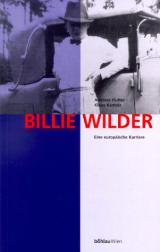 Andreas Hutter, Klaus Kamolz: Billie Wilder: eine europäische Karriere. Wien [u.a.]: Böhlau, 1998
Andreas Hutter, Klaus Kamolz: Billie Wilder: eine europäische Karriere. Wien [u.a.]: Böhlau, 1998Mit seinen Komödien, darunter 'Manche mögen's heiß' und 'Das verflixte 7. Jahr', brachte er Millionen zum Lachen; mit 'Boulevard der Dämmerung', und 'Reporter des Satans' ließ er ihnen dieses Lachen im Halse steckenbleiben. Billie Wilder heißt der Mann, seit er 1934 in Hollywood ankam. Aber was war vorher? Die Autoren begleiten Billie, wie er sich damals noch nannte, durch turbulente europäische Jahre. Als Reporter im Wien der Inflationszeit ist Wilder bei Dreharbeiten auf dem Rosenhügel ebenso Stammgast wie im Literatencafé Herrenhof. Er gerät als Zeuge in den Mordfall Hugo Bettauer und spielt eine Nebenrolle im legendären 'Pressekrieg' zwischen dem Zeitungszaren Imré Bekessy und Karl Kraus. Im Berlin der Roaring Twenties - sein Mentor ist der rasende Reporter Egon Erwin Kisch - betreut er als 'Briefkastentante' Billie eine Frauenrubrik und holt sich bei der Entstehung des 'Blauen Engel' Ezzes von seinem Regie-Vorbild Josef von Sternberg. Als junger Filmenthusiast dreht er 1929 mit Freunden den Klassiker 'Menschen am Sonntag' und schafft so den Sprung zum Ufa-Autor. Bald darauf verschlägt ihn Hitlers Machtübernahme als bettelarmen Exilanten nach Paris; wenig später raunt man sich in Hollywood den Namen eines der hoffnungsvollsten Nachwuchsregisseure zu: Billy Wilder. Der Rest ist Filmgeschichte.
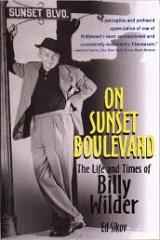 Ed Sikov: On Sunset Boulevard: The Life and Times of Billy Wilder. New York: Hyperion, 1999 [Taschenbuch]
Ed Sikov: On Sunset Boulevard: The Life and Times of Billy Wilder. New York: Hyperion, 1999 [Taschenbuch]From the early years of anti-Semitism and frustration in Austria to the glory of Hollywood and six Academy Awards, Billy Wilder's life is as fascinating as his movies. Now, drawing on new interviews, current research, and previously inaccessible archives, biographer Ed Sikov offers an endlessly entertaining portrait of one of this century's most influential directors and screenwriters. Many of Wilder's legendary films are based on his own life struggles, whether it be his early years as a journalist (Ace in the Hole), the rocky road to success (Sunset Boulevard), or his experiences in Berlin immediately after WWII (A Foreign Affair). This accessible biography illuminates not only Wilder's work but his own intriguing story and the evolution of a character as compelling and complex as any he ever created for the screen. > 688 pp.
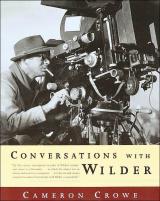 Cameron Crowe: Conversations with Wilder. New York: Knopf, 2001 [Taschenbuch]
Cameron Crowe: Conversations with Wilder. New York: Knopf, 2001 [Taschenbuch]In Conversations with Wilder, Hollywood's legendary and famously elusive director Billy Wilder agrees for the first time to talk extensively about his life and work. Here, in an extraordinary book with more than 650 black-and-white photographs -- including film posters, stills, grabs, and never-before-seen pictures from Wilder's own collection -- the ninety-three-year-old icon talks to Cameron Crowe, one of today's best-known writer-directors, about thirty years at the very heart of Hollywood, and about screenwriting and camera work, set design and stars, his peers and their movies, the studio system and films today. In his distinct voice we hear Wilder's inside view on his collaborations with such stars as Barbara Stanwyck, Gary Cooper, Marilyn Monroe, Jack Lemmon, Tony Curtis, William Holden, Audrey Hepburn, and Greta Garbo (he was a writer at MGM during the making of Ninotchka. Here are Wilder's sharp and funny behind-the-scenes stories about the making of A Foreign Affair, Double Indemnity, Sunset Boulevard, Love in the Afternoon, Some Like It Hot, The Apartment, and Ace in the Hole, among many others. Wilder is ever mysterious, but Crowe gets him to speak candidly on Stanwyck: "She knew the script, everybody's lines, never a fault, never a mistake"; on Cary Grant: "I had Cary Grant in mind for four of my pictures . . . slipped through my net every time"; on the "Lubitsch Touch": "It was the elegant use of the super-joke." Wilder also remembers his early years in Vienna, working as a journalist in Berlin, rooming with Peter Lorre at the Chateau Marmont -- always with the same dry wit, tough-minded romanticism, and elegance that are the hallmarks of Wilder's films. This book is a classic of Hollywood history and lore. > 400 pp.
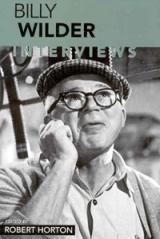 Robert Horton [Hg.]: Billy Wilder: Interviews. Jackson: University Press of Mississippi, 2002
Robert Horton [Hg.]: Billy Wilder: Interviews. Jackson: University Press of Mississippi, 2002Always daring Hollywood censors' limits on content, Billy Wilder directed greats such as Marilyn Monroe, Jack Lemmon, Ginger Rogers, Marlene Dietrich, Kirk Douglas, Audrey Hepburn, and Gary Cooper. Billy Wilder: Interviews follows the filmmaking career of one of Hollywood's most honored and successful writer-directors and spans over fifty years. Wilder, born in 1906, fled from Nazi Germany and established himself in America. Starting with a celebrated 1944 Life magazine profile, the book traces his progress from his Oscar-winning heyday of the 1940s to the 1990s, in which he is still witty, caustic, and defiant. Often playful and sometimes outrageous, but just as often very serious, Wilder details his rise as a Berlin cub reporter to a fledgling screenwriter in Hollywood's "Golden Age." He tells the stories behind his brilliant direction of such classics as Double Indemnity (1944), The Lost Weekend (1945), Sunset Boulevard (1950), Stalag 17 (1953), Sabrina (1954), The Seven-Year Itch (1955), Some Like It Hot (1959), and The Apartment (1960), among others. A dazzling raconteur, Wilder gives the scoop on the royalty of cinema, from the maddening magic of Monroe to the uncanny empathy of frequent alter ego Lemmon. Though his natural tendency is to spin marvelous anecdotes on the subject of show business, Wilder also delivers penetrating and instructive observations on his craft. On screen, his special blend of cynicism and romanticism was always expressed in a style that avoided showiness. Billy Wilder: Interviews includes in-depth profiles, spirited Q&A's, and on-the-set glimpses of the director at work. Taken together, the interviews form an unofficial memoir of a sophisticated artist once described by a colleague as the most unusual and amusing man in Hollywood. > 240 pp., 10 b&w film stills
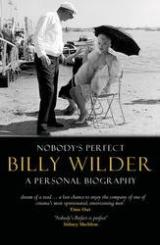 Charlotte Chandler: Nobody's Perfect: Billy Wilder, a Personal Biography. New York/London: Simon & Schuster, 2003 [Taschenbuch]
Charlotte Chandler: Nobody's Perfect: Billy Wilder, a Personal Biography. New York/London: Simon & Schuster, 2003 [Taschenbuch]Having been introduced to each other by Groucho Marx in the mid-1970s, Charlotte Chandler became the biographer of this legendary screenwriter/director. Charlotte made frequent trips to Hollywood to spend time with Wilder and his wife, Audrey. At every visit the tape-recorder was left on, and their conversations were preserved. Over time, Wilder introduced her to his friends, who also were taped for inclusion in the book. The result is an amazing wealth of riches, conversations that are as fresh and vital now as when they were recorded. Included are such greats as Gloria Swanson, William Holden, Ginger Rogers, Kirk Douglas, Audrey Hepburn, Jimmy Stewart, Tony Curtis, Jack Lemmon, Shirley MacLaine and Henry Fonda. The portrait they present of Wilder is both loving and complex, an amalgam of adoration and respect. For Wilder, these were actors, and as long as they did their job well, he wanted to be with them. A case in point is Marilyn Monroe. Wilder made two films with her, SEVEN YEAR ITCH and SOME LIKE IT HOT, and both times he spoke openly about the difficulty working with the emotionally unstable star, 'Marilyn was like smoking,' Wilder revealed. 'I knew she was bad for my health, but I couldn't give her up.'
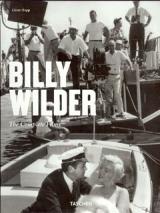 Glenn Hopp: Billy Wilder - The Complete Films. Köln: Taschen, 2003
Glenn Hopp: Billy Wilder - The Complete Films. Köln: Taschen, 2003Billy Wilder (1906-2002) was American cinema's greatest import. Hailing from Austria, Wilder arrived in Hollywood in 1935 and, with his skilled eye and sharp wit, took the town by storm. Exploring nearly all of the silver screen's genres (slapstick comedy, eerie suspense, film noir, courtroom drama, romantic comedy...) and sometimes creating unheard-of genre cocktails (comedy and war in a Nazi prison camp in Stalag 17) he graced every film he directed with the inimitable and magical "Wilder touch." That films like Sunset Boulevard, Witness for the Prosecution, Some Like it Hot, The Apartment, and Love in the Afternoon all hall from the same director/co-writer is a remarkable thing. With 26 films to his name, Billy Wilder was not only one of the greatest and most prolific filmmakers of all time but also the most versatile. > 192 pp.
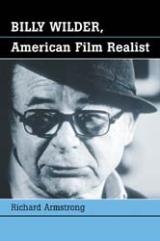 Richard Armstrong: Billy Wilder, American Film Realist. Jefferson: McFarland & Co., 2004 [Taschenbuch]
Richard Armstrong: Billy Wilder, American Film Realist. Jefferson: McFarland & Co., 2004 [Taschenbuch]The films of Billy Wilder, from Double Indemnity to Some Like It Hot, are American classics created by a brilliant Austrian in love with his newfound country. This is a re-examination of the key American films of Wilder, often challenging previous readings of his filmmaking style and personality, emphasizing the pop-cultural, film-historical, and sociohistorical content of well known films like Sunset Boulevard and less frequently remembered ones, like The Fortune Cookie. The book interprets Wilder as more than the "cocky little Viennese" or "closet Romantic" stereotypes often attached to him. Here the student will find provocative analysis and the enthusiast will find evocative commentary on one of the most important figures in American film. Photographs add to the text, and a complete filmography and bibliography are also included. Fully indexed. > 172 pp., photos, filmography, notes, bibliography, index
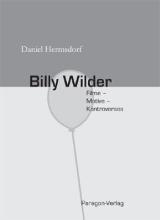 Daniel Hermsdorf: Billy Wilder. Filme - Motive - Kontroverses. Bochum: Paragon-Verlag, 2006
Daniel Hermsdorf: Billy Wilder. Filme - Motive - Kontroverses. Bochum: Paragon-Verlag, 2006Am 22. Juni 2006 wäre Billy Wilder 100 Jahre alt geworden. Sein Leben ist eine Geschichte des 20. Jahrhunderts. Seine Filme sind Filmgeschichte. Für die publizistische und wissenschaftliche Öffentlichkeit scheinen die Koordinaten für eine Charakterisierung von Wilders Filmen klar zu sein: Wilder, der Meister der Komödie. Wilder, der auch in Genres wie dem Kriegsdrama und der Liebesromanze auf seine Weise Meilensteine gesetzt hat. Und es gibt die Rede von Wilder, dem Zyniker und Medienkritiker. In Filmen wie "Sunset Boulevard", "Reporter des Satans" oder "Extrablatt" wird seine Sicht der Filmindustrie und des Journalismus besonders deutlich. Was kennzeichnet darüber hinaus in diesen Filmen jene skeptische Haltung, die in der Form des kommerziellen Hollywoodfilms darin reüssiert hat, ein kritisches Bewusstsein zu bewahren und neben den inhaltlichen Themen das Kino selbst in seinem Wesen, seiner zeichentheoretischen, soziopolitischen, psychologischen und ökonomischen Realität zu erfassen? In einer ausführlichen Interpretation der Regiearbeiten Wilders geht Daniel Hermsdorf dieser und anderen Fragen nach. Eines der Ergebnisse dieser Recherche ist, dass die vorgebliche Geringschätzung Wilders für Sigmund Freuds Psychoanalyse fragwürdig genannt werden kann. "Setzen Sie sich lieber auf die Couch." - "Die Couch? Das wird ja immer gemütlicher hier!" sagt Captain Pringle zu Erika von Schlütow in "Eine auswärtige Affäre". Doch was Wilder in Kinosälen und Fernsehzimmern inszeniert hat, ist nicht nur Entertainment. Es lässt sich sehen als konsequente Befragung der Funktionen von Fantasie und bildlicher Repräsentation, den psychischen Dispositionen von Filmemachern und -konsumenten, der Zeichenlogik des Films als kapitalistischer Massenware und erfolgreichster Kunstform der Industriegesellschaft. Dass Wilders Filme als Ware funktionieren, muss nicht mehr bewiesen werden. Dass sie jedoch ihren eigenen Charakter als Ware differenziert thematisieren, ist eine Entdeckung. Und in dieser Selbstreflexion werden Freuds Definitionen von Traumzeichen und Symptomen erneut aktuell - als bewusste künstlerische Kritik der Erzählform des Spielfilms, in der sich unsere Kultur ihre neuen Mythen mit den Vorzeichen von Vermarktung und Reproduzierbarkeit erträumt hat. Eine große Zahl zuvor selten thematisierter ästhetischer Strategien des Regisseurs werden so erstmals deutlich - es ist das Vermächtnis eines brillanten Ironikers und Moralisten, der bei aller öffentlichen Lobpreisung dennoch oft verkannt worden ist.
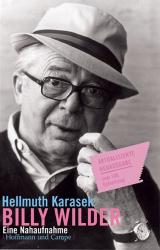 Hellmuth Karasek: Billy Wilder: Eine Nahaufnahme. Hamburg: Hoffmann und Campe, 2006
Hellmuth Karasek: Billy Wilder: Eine Nahaufnahme. Hamburg: Hoffmann und Campe, 2006Billy Wilder schrieb und drehte die unverwüstlichste Marilyn-Monroe-Komödie: "Manche mögen`s heiß", schuf eine der schönsten Marlene-Dietrich-Rollen: "Zeugin der Anklage", machte den eindringlichsten Hollywood-Film über Hollywood: " Sunset Boulevard", und wagte die frivolste Bürokomödie: " Das Appartement". Billy Wilder, dessen bewegtes Leben als Journalist und Reporter in Wien begann, wo er von Sigmund Freud empfangen und vor die Tür gesetzt wurde, der in Berlin eine selbsterlebte Meisterreportage als Gigolo veröffentlichte und Drehbücher für Heinz Rühmmann verfaßte, kam 1933 über Paris nach Hollywood - wo er für Ernst Lubitsch und Greta Garbo die unsterbliche "Ninotschka " schrieb. Der, laut Marlene Dietrich, "witzigste Mensch, dem ich je begegnet bin", erzählt die aufregenden Abenteuer seines Lebens - vom Begräbnis des (vor)letzten Osterreichischen Kaisers, von den turbulenten Jahren irn Berlin der "Wilden Zwanziger", von den gemeinsam mit Peter Lorre im Vorraum einer Damentoilette verbrachten Emigranten-Nächten in Hollywood. Billy Wilder hat sich mit Humphrey Bogart, Louis B. Mayer und Samuel Goldwyn gestritten, hat mit "Eins, zwei, drei" die frechste Komödie über den Kalten Krieg gedreht, hat aus Jack Lernmon und Walter Matthau berühmte Komiker gemacht, Charles Laughton mit dem Monokel funkeln lassen und die Dreharbeiten mit der Monroe überstanden. Schauplätze seines Lebens und seiner Arbeit sind die europäischen und amerikanischen Metropolen: Wien und Berlin, London, New York, Hollywood und Paris - wo er drehte und arbeitete, war die Zeit immer auf dem Höhepunkt - manchmal sogar dank ihm und durch ihn. Die "Nahaufnahme", in mehrjähriger Zusammenarbeit mit dem Billy-Wilder-Fan Hellmuth Karasek entstanden, ist die brillant erzählte, oft umwerfend komische Lebensgeschichte eines der faszinierendsten Künstler und Zeitzeugen unserer Epoche. > 558 Seiten
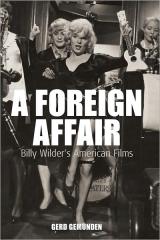 Gerd Gemünden: A Foreign Affair: Billy Wilder's American Films. New York: Berghahn Books, 2008
Gerd Gemünden: A Foreign Affair: Billy Wilder's American Films. New York: Berghahn Books, 2008With six Academy Awards, four entries on the American Film Institute’s list of 100 greatest American movies, and more titles on the National Historic Register of classic films deemed worthy of preservation than any other director, Billy Wilder counts as one of the most accomplished filmmakers ever to work in Hollywood. Yet how American is Billy Wilder, the Jewish émigré from Central Europe? This book underscores this complex issue, unpacking underlying contradictions where previous commentators routinely smoothed them out. Wilder emerges as an artist with roots in sensationalist journalism and the world of entertainment as well as with an awareness of literary culture and the avant-garde, features that lead to productive and often highly original confrontations between high and low. > 206 pages, 36 ills, chronology, filmography, bibliog., index
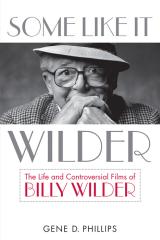 Gene D. Phillips: Some Like It Wilder: The Life and Controversial Films of Billy Wilder. Lexington: The University Press of Kentucky, 2010
Gene D. Phillips: Some Like It Wilder: The Life and Controversial Films of Billy Wilder. Lexington: The University Press of Kentucky, 2010One of the most accomplished writers and directors of classic Hollywood, Billy Wilder (1906-2002) directed numerous acclaimed films, including Sunset Boulevard (1950), Sabrina (1954), The Seven Year Itch (1955), Witness for the Prosecution (1957), and Some Like It Hot (1959). Featuring Gene D. Phillips's unique, in-depth critical approach, Some Like It Wilder: The Life and Controversial Films of Billy Wilder provides a groundbreaking overview of a filmmaking icon. Wilder began his career as a screenwriter in Berlin but, because of his Jewish heritage, sought refuge in America when Germany came under Nazi control. Making fast connections in Hollywood, Wilder immediately made the jump from screenwriter to director. His classic films Five Graves to Cairo (1943), Double Indemnity (1945), and The Lost Weekend (1945) earned Academy Awards for best picture, director, and screenplay. During the 1960s, Wilder continued to direct and produce controversial comedies, including Kiss Me, Stupid (1964) and The Apartment (1960), which won Oscars for best picture and director. This definitive biography reveals that Wilder was, and remains, one of the most influential directors in filmmaking. > 464 pp., 47 photographs
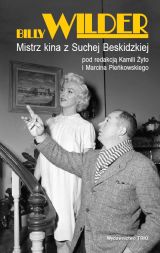 Kamila Żyto & Marcin Pieńkowski [Red.]: Billy Wilder. Mistrz kina z Suchej Beskidzkiej. Warszawa: Trio, 2011
Kamila Żyto & Marcin Pieńkowski [Red.]: Billy Wilder. Mistrz kina z Suchej Beskidzkiej. Warszawa: Trio, 2011Billy Wilder, sławny hollywoodzki reżyser i scenarzysta urodził się – o czym wciąż wie niewielu kinomanów – w Suchej Beskidzkiej, skąd jego rodzina wyemigrowała do Wiednia. Karierę w branży filmowej rozpoczął w międzywojennym Berlinie. Po dojściu nazistów do władzy uciekł przez Paryż do Stanów Zjednoczonych. Tam stał się twórcą szalonych komedii (Pół żartem, pół serio, Słomiany wdowiec), mrocznych kryminałów spod znaku noir (Podwójne ubezpieczenie, Bulwar Zachodzącego Słońca) i słodko-gorzkich portretów amerykańskiego społeczeństwa (Garsoniera). Jego filmy przyniosły mu uznanie widzów na całym świecie i sześć statuetek Akademii Filmowej. Dzięki niemu Marilyn Monroe stała się filmową ikoną seksu, zaś Jack Lemmon i Walter Matthau jednym z najzabawniejszych duetów w historii kina. > 208 Seiten, Paperback
Billy Wilder’s work remains a masterful combination of incisive social commentary, skilled writing and directing, and unashamed entertainment value. One of Hollywood’s foremost emigre filmmakers, Wilder holds a key position in film history via films that represent a complex reflection of his European roots and American cultural influences. This wide-ranging collection of essays by an international group of scholars examines the significance of Wilder’s filmmaking from a variety of original perspectives. Engaging with issues of genre, industry, representation and national culture, the volume provides fresh insights into Wilder’s films and opens up his work to further exploration. > VIII, 246 S.; notes, bibliography, index